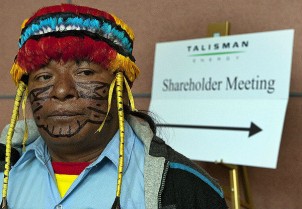
We like to share with you a press release from Amazon Watch with yet again some good news for environmental justice. To understand this latest good news arising from the depth of the Amazon as part of a global struggle for environmental justice: here is a EJOLT report on issues in the economics of ecosystems and biodiversity and here is a video on Yasuni – where a similar struggle has an original angle. And only last week we posted very similar news from another part of the Amazon.
By Amazon Watch
Calgary, Canada – Today Talisman Energy (TLM) announced its decision to cease oil exploration activities in the Peruvian Amazon and to exit the country upon completion of ongoing commercial transactions.
“We have fought long and hard against Talisman’s drilling in our territory because of the negative environmental and social impacts we have seen from oil drilling around the world,” said Peas Peas Ayui, President of the National Achuar Federation of Peru (FENAP). “Now that Talisman is leaving we can focus on achieving our own vision for development and leave a healthy territory for future generations.”
Talisman is the fifth oil company to withdraw from controversial Block 64, located in the heart of indigenous Achuar territory in a remote and bio diverse region of the Amazon rainforest. Talisman has been exploring in Peru since 2004 and has come under increased pressure by human rights groups and shareholders for operating without Achuar consent.
“Talisman has had to face up to what the Achuar told them when they first invested in Block 64: The company cannot drill without the consent of the Achuar people,” said Gregor MacLennan, Peru Program Coordinator at Amazon Watch. “Talisman’s exit sends a clear message to the oil industry: Trampling indigenous rights in the rush to exploit marginal oil reserves in the Amazon rainforest is not an option.”
Despite Talisman’s claim of attaining local support from communities and signing good neighbor agreements with 66 communities downriver from their operations, the company never had the consent of the majority of communities living within Block 64. Talisman first invested in Peru one year after leaving Sudan and became sole operator in 2007, shortly after John Manzoni’s appointment as CEO. Manzoni was replaced by ex-TransCanada CEO Hans Kvisle on Monday this week.
“We are the owners and the original people of this land,” said Peas Ayui. “No outside person or company may enter our territory by force, without consultation and without asking us. We have been fighting against oil development on our land for 17 years and we maintain the same vision to protect our territory and resources for future generations. Let this be a clear message to all oil, mining and logging companies: we will never offer up our natural wealth so that they can extract our resources and contaminate our land.”
Block 64 is just one of several new efforts to extract oil from the headwaters of the Amazon in Northern Peru and Southern Ecuador, among the most bio diverse places on earth. Anglo-French company Perenco was recently awarded a production license to operate in Block 67 in Peru despite a legal case against them for drilling in isolated peoples’ territory. ConocoPhilliips has faced mass protests in Iquitos, Peru over plans to drill wells in a protected area in the Nanay river basin east of Block 64. In Ecuador, the government plans to auction new oil blocks on the Peruvian border despite strong indigenous opposition. The Kichwa community of Sarayaku recently won a case in the Inter-American Court of Human Rights against the Ecuadorian government for signing an oil contract without their consent or consultation.
For more information, contact: Gregor MacLennan, +1 415.494.7378, email hidden; JavaScript is required Caroline Bennett, +1 415.487.9600, email hidden; JavaScript is required





Eutambém estou contente com esta vitoria dos direitos indigenes defender o meio ambiente
Brilliant Read, I liked the biodiversity bit